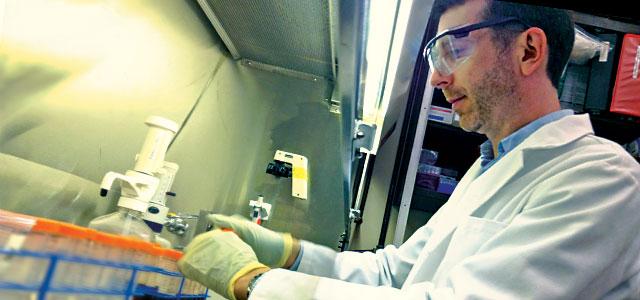
John Merriman in the lab
Battling “Chemo Brain”
The National Cancer Institute estimates that 2.6 million US women with a history of breast cancer were alive in 2008 due in large part to advances in treatment. That’s good news.
Yet it’s also true that this new generation of survivors faces many new challenges, including cognitive changes that can occur after diagnosis and treatment of cancer. These cognitive changes are the focus of my current research. In particular, I am studying diminished attentional function – the decreased ability to concentrate for a sustained period of time.
My interest emerged from my time as an oncology nurse, when some patients told me that they had difficulty concentrating on normal tasks and social activities during their treatments. These changes caused them to have difficulty engaging in meaningful activities, controlling anxiety and depressive symptoms, and maintaining healthy social interactions; for some, the problems continued after treatment into the period of survivorship. Tasks that were once easy could now feel overwhelming, threatening reintegration into their professional and personal lives.
I began wondering why these cognitive changes varied in severity, with some of my patients experiencing severe difficulty and some no difficulty at all despite similar diagnoses and treatments.
Of course, science begins with questions like that. To gain a better understanding of the factors that drive these differences in patient experience, I moved from the bedside to the bench by enrolling in the PhD program at UC San Francisco School of Nursing. Part of my motivation was that while there are many possible reasons for the differences in attentional function, one of the underlying factors is almost surely differences in genetics. These differences may put women at risk for more severe cognitive changes – or protect them from these changes.
With the help of my mentors Christine Miaskowski and Bradley Aouizerat, who guided me through the methods needed to study possible genetic factors, I used my dissertation to look for associations between variations in genes that encode for inflammatory cytokines and neurotransmission, and self-reported attentional function in women with breast cancer. I have found that differences in these genes are indeed associated with risk for more severe changes in self-reported attentional function during and after treatment for breast cancer.
If these findings are replicated, they could eventually lead to better prediction of the cognitive changes patients experience, so that clinicians can better target their education and interventions. Ultimately, these findings could contribute to better understanding of the physiological basis for cognitive changes and – as is my hope – ultimately improve the quality of life for breast cancer patients and survivors.
If that should occur, I take particular pride that questions posed to me when I was a bedside nurse drove me to become a scientist who would have the tools necessary to begin uncovering answers.
John Merriman is a recent graduate of the PhD program at UCSF School of Nursing. He will continue his research as a postdoctoral scholar in cancer survivorship at the University of Pittsburgh School of Nursing. His work has received funding from the National Institute of Nursing Research, the American Cancer Society, the Oncology Nursing Society Foundation and the UCSF Nursing Alumni Association.



